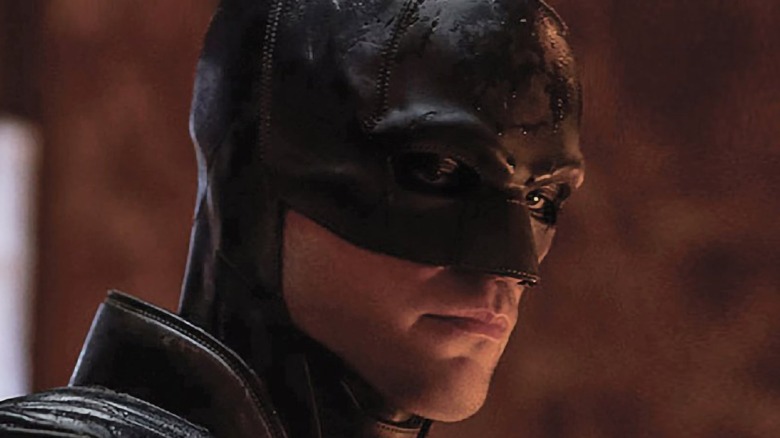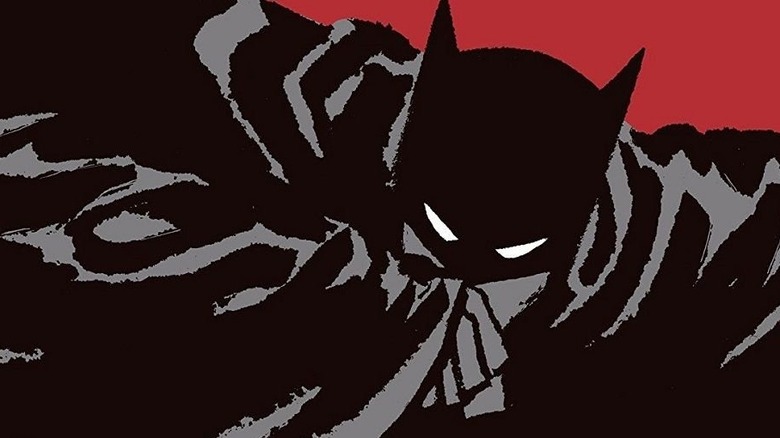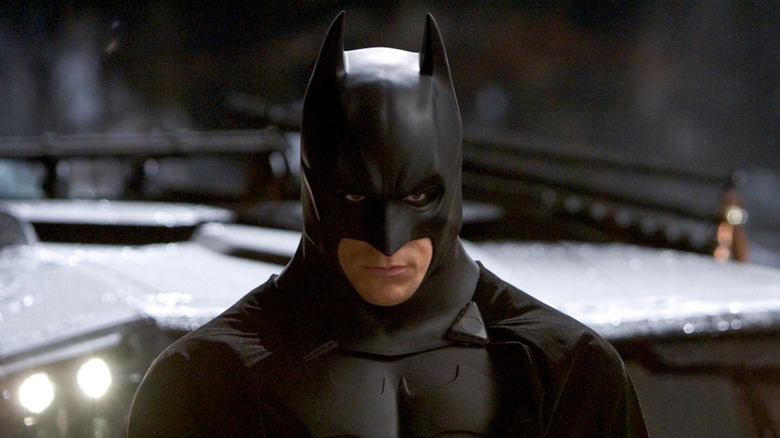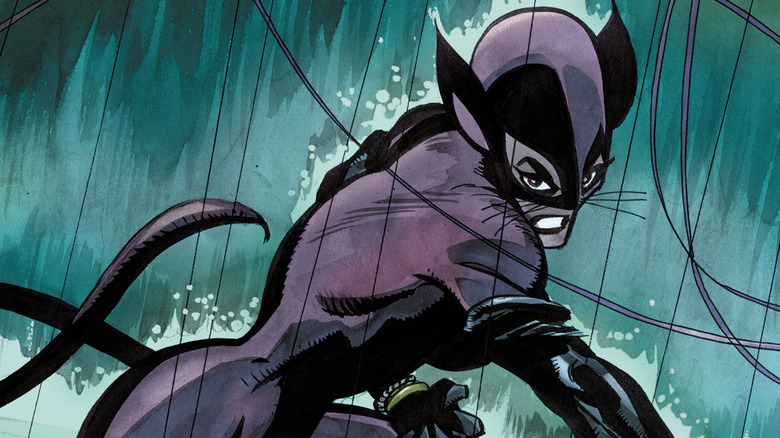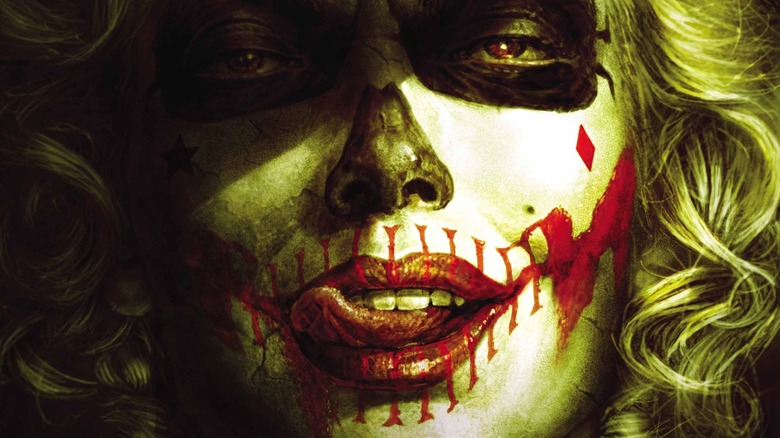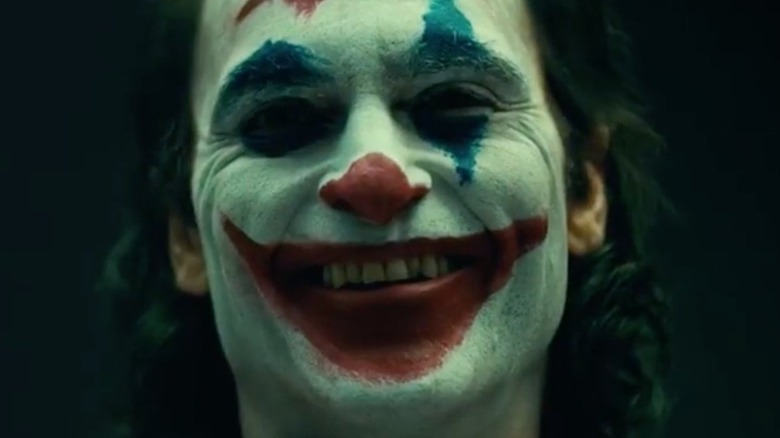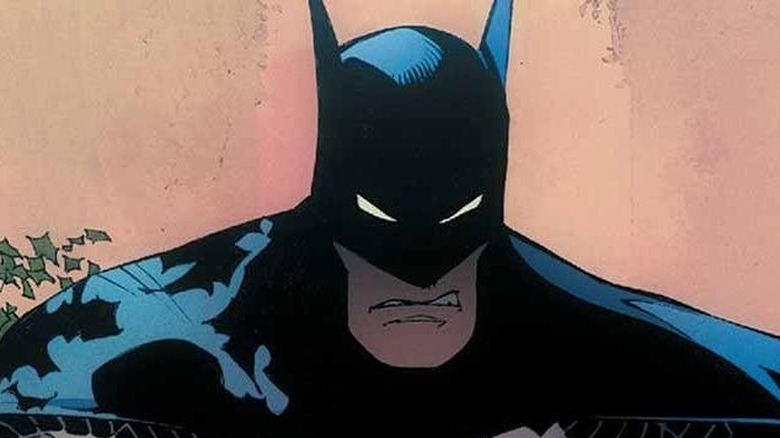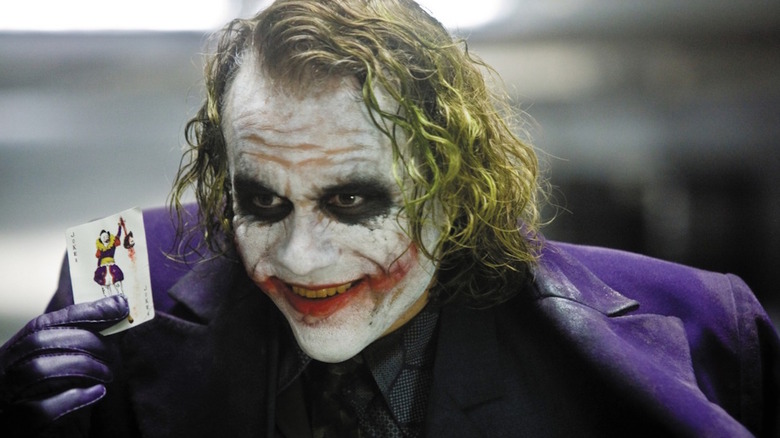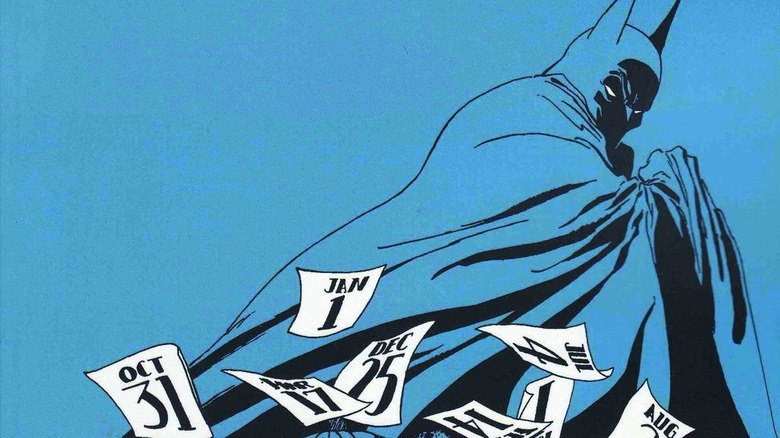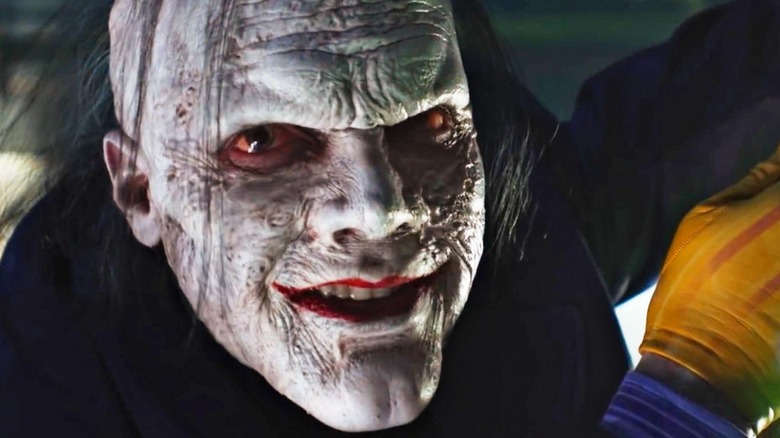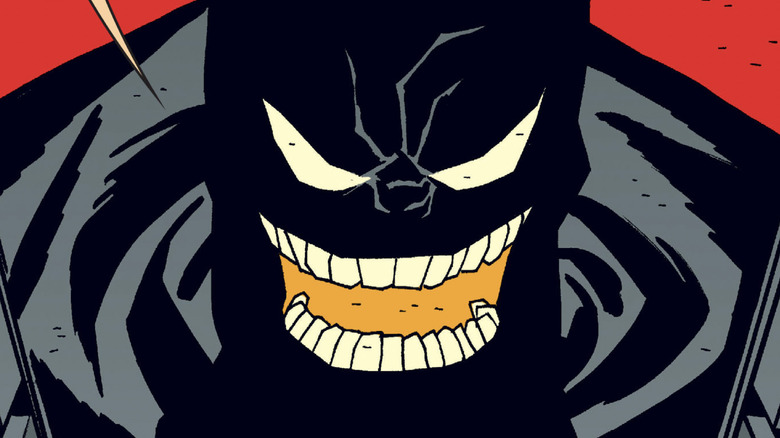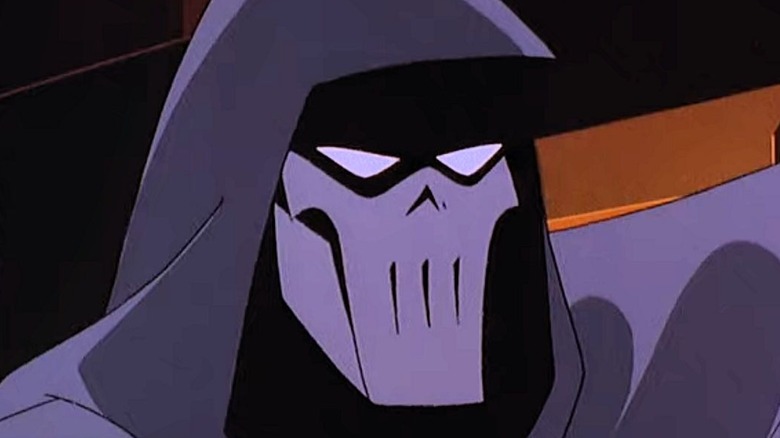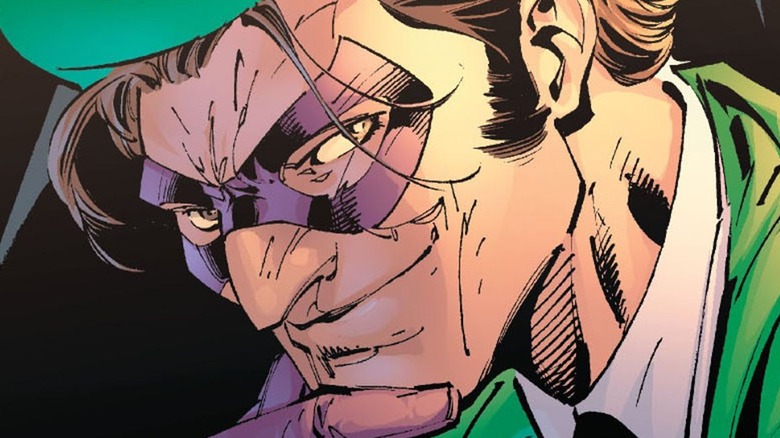Essential Stories To Watch And Read Before Seeing The Batman
On March 4, the iconic DC Comics hero Batman gets his first solo film since 2012's "The Dark Knight Rises," a gap just shy of a decade. Titled "The Batman," the new film already looks promising enough to be worth the wait. The film's trailers show off a Gotham City unlike any we've seen before, one rife with shadow, horror, and psychological struggle. "The Batman" may be the darkest, most violent, and most harrowing of the hero's movies yet, as it delves deeper than ever before into Gotham's innermost flaws — and the Caped Crusader's, as well.
This Gotham, this Batman, and these conflicts may be new onscreen, but they have their roots in past incarnations and a wealth of source material. With a story spanning almost three hours, "The Batman" is certain to cover a lot of ground in the Dark Knight's mythos. It will explore his formative years as a vigilante and detective, as well as his budding relationships with characters like Catwoman, Jim Gordon, the Penguin, and the Riddler. Luckily for writer/director Matt Reeves, he was able to dig for inspiration in a deep, rich quarry of Batman lore. Several writers have revealed pieces of Batman's origin story over the years, in comics, movies, and television, and Reeves was able to pick and choose which fragments were worthy of reimagining and retelling.
You, too, can trace the path that Reeves took and immerse yourself in the history of Batman's youth, unforgiving enemies, and crippling inner demons. To help, here are the most essential stories to watch and read before seeing "The Batman."
Batman: Year One
If there is one book that's required reading, it's "Batman: Year One." The comic arc was written by the legendary Frank Miller and drawn by one of his best collaborators, David Mazzucchelli. The two creators used "Year One" as an opportunity to showcase a side of Batman that had been previously unseen: his first year as a hero and the steep learning curve therein. Matt Reeves told Esquire that the way "Year One" emphasized Batman's humanity and fallibility left him "blown away."
Before "Year One," it was rare to see Batman fail. The so-called world's greatest detective was, in almost every other incarnation, engaged in chess matches with his adversaries in which he was usually several moves ahead. Seeing him underestimate street-level thugs, take severe beatings, and even be captured by police was revelatory for many readers -– including Reeves. It was as if "Year One" had suddenly made Batman human and thereby allowed his writers to tell human stories.
From its trailers, it's clear that the hero's humanity will be on full display in "The Batman." And though the film will actually feature a Dark Knight in year two of his crimefighting career, it's clear that "Year One" was one of its biggest inspirations.
Batman Begins
Matt Reeves isn't the only director to take an interest in "Batman: Year One." When tasked with creating a trilogy of Batman movies that began with an origin story, Christopher Nolan also looked to the acclaimed comic arc for guidance. The result was "Batman Begins," the first entry in the Dark Knight Trilogy.
Compared to the relative grit and realism of "Year One," Nolan's first movie seems almost an outlandish fantasy story. It features mountaintop ninja cabals, masked psychopaths spraying hallucinogenic fear gas, and the impossible, retro-futuristic architecture that became a staple of '90s-era Gotham. But when compared to its immediate predecessor, the much-maligned kaleidoscope of leather and concert lighting that was 1997's "Batman and Robin," it becomes clear just how much work Nolan put in to grounding the hero in the real world.
"Batman Begins" will forever remain an important piece of the character's cinematic history because it showed what a competent director could do with Batman if given the resources and freedom. Nolan's trilogy changed the game, not just for Batman but superhero movies in general. It paved the way for superhero movies that draw more from dramas than cartoons and is essential viewing for fans of "The Batman."
Catwoman: When in Rome
There is no more iconic duo in Batman's long publication history than Jeph Loeb and Tim Sale. Between "Haunted Knight," "The Long Halloween," "Dark Victory," and "Hush" (which was without Sale), the pair have authored some of the Caped Crusader's most beloved and influential stories ever. Loeb's masterfully enigmatic stories and Sale's bold, contrast-heavy art worked in combination to influence Batman's overall tone more than perhaps any single creative team.
Luckily for Catwoman fans, Loeb and Sale also released a story that put the cat front and center, titled "Catwoman: When in Rome." The story follows Selina Kyle as she spends a week in Rome, probing the local mafia for answers about her unidentified parents. For most of her trip, she's accompanied by Edward Nygma, aka the Riddler, in one of his several turns away from outright villainy. The story is an entertaining read for comic fans in general as Loeb and Sale maintain their high standard of storytelling throughout, but the story also has a special significance for "The Batman" fans.
The upcoming film will lean heavily on both Batman's mercurial relationship with Catwoman and his protracted intellectual war with the Riddler. "Catwoman: When in Rome" sheds ample light on both characters, their complicated relationship with each other, and their place within Gotham's labyrinthine hierarchy.
Batman: Damned
There aren't many Batman movies like "The Batman" and there aren't many Batman comics like "Batman: Damned" –- largely for the same reason. The upcoming movie has given fans every indication that it will see Batman and Gotham at their darkest and most horrific yet, and the comics series still holds the same distinction. After DC Comics decided to shutter its subsidiary publisher Vertigo, they opted to replace it with DC Black Label, a new imprint focusing on "edgy and provocative" stories that were too mature for mainstream DC continuity. The very first series to come from DC Black Label was "Batman: Damned" and it more than lives up to the promise of edginess and provocation.
The series took Batman through a gauntlet of grief, pain, and psychological horror. It included, among many other merciless plot points, demonic possession, attempted sexual assault, and the deaths of both Batman and the Joker. The story blended the horror and psychological thriller genres in order to portray a Batman who was near to his mental breaking point –- just like the struggle Reeves promised would be central to "The Batman." To see the Bat truly broken, there is no better arc -– with apologies to Bane's efforts in "Batman: Knightfall" –- than "Batman: Damned."
If you or anyone you know has been a victim of sexual assault, help is available. Visit the Rape, Abuse & Incest National Network website or contact RAINN's National Helpline at 1-800-656-HOPE (4673).
Joker
Already, the darkness (both literal and figurative) that pervades both "The Batman" trailers is drawing comparisons to "Joker," the darkest DC film to date. While "The Batman" will be rated PG-13, it looks as if it will present a tone and content more akin to "Joker" than any of the PG-13 Batman movies, though without as much graphic violence.
Like "Joker," "The Batman" will be a standalone film with no ties to the DCEU. Also like "Joker," that means that its creators have exponentially more leeway when it comes to the inclusion of mature themes. Any film set in the DCEU is required to sit within a certain range of tones in order to maintain congruity. Because of that, a meeting between Joaquin Phoenix's standalone Joker and Zachary Levi's DCEU-based Shazam, for example, would be as jarring and irreconcilable as when the cartoon creatures of Imaginationland met terrorists. Luckily, "The Batman" has no such limitation and, despite its rating, has an unusually large amount of freedom in its presentation.
To see what creative freedom can do for a skilled director, watch "Joker." The film is also essential viewing for cinema fans in general, as it was the first superhero movie to knock the socks off the Academy and sweep every major Best Actor award, including the Oscar.
Batman: Zero Year
Though "Batman: Year One" remains the most required reading on this list for a number of reasons, including its quality and legacy, DC's "Zero Year" relaunch event may end up being the single most influential comic series on "The Batman." More than any other comic series, "Zero Year" parallels "The Batman" in setting, tone, characters, and plot.
After DC's epic "Flashpoint" event, the company relaunched all of its series and characters, creating a new canon continuity known as "The New 52." With a new timeline came the need for new origin stories, and that was the role that "Zero Year" played. "Batman: Zero Year" rewrote the Dark Knight's origin story, replacing the events of "Year One" (or, more accurately, relegating them to another universe) and allowing new themes to emerge throughout Batman's stories. Compared to "Year One," "Zero Year" spends more time on Batman's detective work, Gotham's corrupt ruling class, and the Riddler as the main antagonist. In each of those aspects, "Zero Year" has more in common with "The Batman" than "Year One," and will likely serve as an excellent primer for the new film.
The Dark Knight
Since its release in 2008, mountains of praise have been heaped upon Christopher Nolan's "The Dark Knight" and with good reason. The film is not only Batman at his best, but superhero movies in general. It is still the highest-rated and highest-grossing (domestic) Batman film to date. Heath Ledger's turn as the Joker remains, even in the face of Phoenix's stellar take, one of the most celebrated performances of the modern era. There is simply too much adulation due to "The Dark Knight" to include it all here. In short, "The Dark Knight" set the bar for all future Batman movies. It's inevitable, then, that any success "The Batman" achieves will be weighed against that of Nolan's masterpiece.
Any fans of "The Batman," or just Batman in general, are missing out if they haven't seen "The Dark Knight." Even more so than its predecessor, "Batman Begins," "The Dark Knight" was able to ground the titular character and his environment in the real world. Perhaps the only fantastical aspect of the movie was the inhuman efficiency of the Joker's preparation, organization, and forethought. Otherwise, the film is as plausible as Batman gets, and that level of realism certainly paved the way for "The Batman."
Batman: The Long Halloween
If any Batman comic book story could be called the most celebrated or best overall, it would be "Batman: The Long Halloween." Only a handful of stories, such as "Year One," "The Killing Joke," and "The Dark Knight Returns" are even in the running against "The Long Halloween" and even then, there is only one likely victor. Like "Catwoman: When in Rome," "The Long Halloween" was authored by Jeph Loeb and drawn by Tim Sale, and the story may be their finest work.
It seems every other creative to helm a Batman project cites "The Long Halloween" as an inspiration and its influence on the Caped Crusader's subsequent media has been undeniable. But "The Batman" will likely be the film to draw most heavily yet from the comic. Like "The Batman," "The Long Halloween" features a young Batman learning his trade, maintains a noir aesthetic, focuses on Batman's detective work, features a young Jim Gordon as Batman's close friend, and shows off the gradual transition of Batman's famous rogue's gallery from simple criminals to supervillains. Luckily, the story now exists as both a comic series and a duology of animated movies, so you can digest the legendary story however you please.
Gotham
Running for 100 hour-long episodes, "Gotham" had more room than other medium, comics included, to thoroughly flesh out the origins of the Batman mythology. The show seized upon the opportunity and delved deep into the lives and struggles of Gotham City's dramatis personae, managing to give each a solid origin and a solid arc. With all of its time, "Gotham" was able to carefully construct and reveal the fantasy realm that Batman prowls, slowly transforming an average metropolis (no, not that Metropolis) into a colorful collection of rival powers and superpowers.
"Gotham" is an essential Batman story because it managed to tell so many pieces of the city's lore better than any other source. It invented new characters, reinvented old favorites, and grounded even the most outlandish of Batman's villains in relative naturalism. When combined with the show's focus on Jim Gordon and the GCPD, its groundedness makes "Gotham" one of the Batman media that allow movies like "The Batman" to exist. "Gotham" was decidedly not a show for children, and despite its rating, "The Batman" won't quite be, either. Instead, the movie will borrow the realism and emotional depth that can only be found in Batman stories like "Gotham."
Batman: Ego
In multiple interviews, Matt Reeves has made it clear that "Batman: Ego" was an inspiration while writing "The Batman." Though not considered a classic in the same vein as "The Long Halloween" and "Year One," "Ego" is nonetheless an essential read ahead of "The Batman." Perhaps better than any other Batman story, the "Ego" one-shot examines the psychological toll that being Batman takes on Bruce Wayne — and vice-versa.
Throughout "Ego," Wayne deals with a dangerously fractured psyche. Wayne sees Batman as a separate entity, a ghoulish personification of his guilt and fear. The "two" of them are able to talk, and the Batman persona largely gives a voice to all of Wayne's mistakes, regrets, and failures. Ultimately, the psychic turmoil allows Wayne to accept his fears as an integral part of his being, thereby becoming a healthier, more complete Batman.
Since Reeves has repeatedly name-dropped "Ego" and stressed his attempts to portray Batman's psychological conflict, it's likely that "The Batman" will see Robert Pattinson's Wayne undergo a similar trial as the Batman in "Ego." Fear has long been an important part of Batman's character, and "The Batman" is poised to dissect it as no other film has.
Batman: Mask Of The Phantasm
One of the most beloved pieces of Batman media, "Batman: The Animated Series" defined the character for an entire generation. Between Bruce Timm's art, Kevin Conroy's voicing of Batman, Mark Hamill's voicing of Joker, and the invention of Harley Quinn, the cartoon remains a keystone in Batman's foundation. It also spawned a pair of feature films, one of which was entitled "Batman: Mask of the Phantasm."
The film is still regarded as one of the best Batman movies – animated or not — ever released. In particular, it is often cited as one of the best Batman stories to explore and expound upon Bruce Wayne's personality and humanity, and "The Batman" himself, Robert Pattinson, agrees.
In an interview with Premiere France (via The Batman Film News), Pattison promised that "The Batman" would accurately "capture the inner bubbling of the character" and opined that the only other Batman film to ever do so was "Mask Of The Phantasm." He added that the animated movie helped him finally understand Batman, saying, "When I saw ['Mask Of The Phantasm'], it clicked: being Batman is a kind of curse, it's a burden." Reeves and Pattinson have both promoted "The Batman" as the most nuanced, human Batman yet, and it would seem that "Mask Of The Phantasm" is the bar they're hoping to beat.
Batman: Hush
Legendary writer Jeph Loeb makes the list once again, this time accompanied by the equally legendary artist Jim Lee. Together, they created the comic "Batman: Hush." Aside from deserving a read based on pure quality, "Hush" also touches on nearly every major aspect of "The Batman" before it closes.
Loeb and Lee's "Hush" was one of the first Batman comics to seriously suggest a romantic relationship between Batman and Catwoman. It also spent the majority of its 12 issues emphasizing Batman as a detective rather than a costumed brawler. "Hush" also uses Gotham's elite, and in particular Batman's parents, as plot devices. Perhaps most notable of all, the overarching mystery behind the entire run turns out to have been masterminded by the Riddler. Altogether, the pieces of "Hush" add up to an essential and informative read for would-be viewers of "The Batman."
Like every entry on this list, "Hush" is a first-rate, entertaining read for any fan of the Dark Knight, and especially so for its role in inspiring Matt Reeves's "The Batman." The upcoming film may be a bold, new direction for big-screen Batman, but it found its way by using a number of essential Batman stories as signposts.
